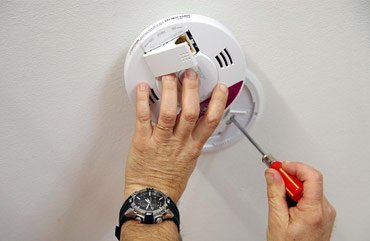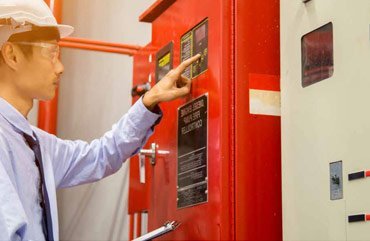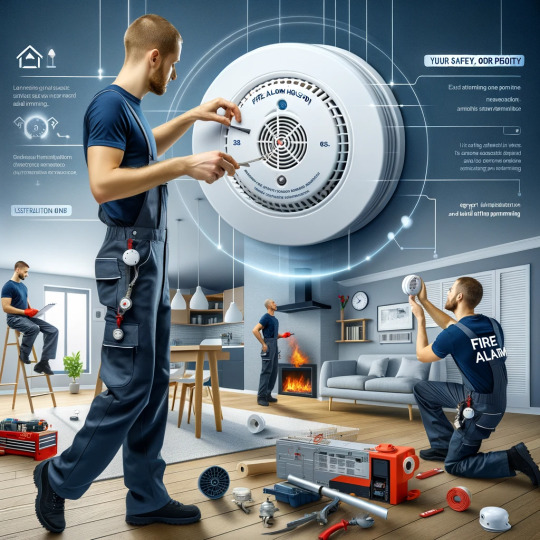Text

Fire Alarm Houston provides Fire Alarm Systems Installation, Inspection & Monitoring Services in Houston, TX and the surrounding areas. Since 2001, we've been recognized as the Best Provider of Fire Alarm Systems in Houston, TX. Our mission is to Install/Set up Top Notch Fire Safety Systems to Houston, Harris County, Fort Bend County as well as the surrounding areas.
If you are looking for the World Class Fire Alarm Installation & Monitoring Companies Near You in Houston, TX, this is the right time to Contact Us for Fire Alarm Systems or Services in Texas, give us a Call Now @ 832-626-7837 or complete the Online Form for a Quote.
Look up our recent work: https://www.firealarmhouston.com/about-us/jobs
#FireAlarmHouston#FireSafety#HoustonTX#FireAlarmInstallation#MonitoringServices#TopNotchSafety#BestProvider#WorldClassInstallation#HoustonSafety#FireAlarmServices#TexasSafety#ContactUsNow#CallToday#GetAQuote
0 notes
Text

Benefits of remote monitoring and notification capabilities in modern fire alarm systems
Remote monitoring and notification capabilities in modern fire alarm systems offer several benefits:
Early Detection: Remote monitoring allows for the detection of fire incidents as soon as they occur, even when there are no personnel present on-site. This early detection can significantly reduce response times and minimize damage.
24/7 Monitoring: With remote capabilities, fire alarm systems can be monitored around the clock, providing continuous protection against fire hazards. This ensures that any potential issues are identified and addressed promptly, regardless of the time of day.
Improved Safety: By promptly notifying designated personnel or emergency services about a fire incident, remote monitoring enhances overall safety for occupants and property. This rapid response can help evacuate individuals and mitigate risks before the situation escalates.
Reduced Downtime: Remote monitoring enables quick identification of system faults or malfunctions, allowing for timely maintenance and repairs. This proactive approach helps minimize system downtime, ensuring continuous protection against fire hazards.
Cost Savings: By preventing extensive fire damage through early detection and rapid response, remote monitoring can potentially save businesses significant costs associated with property damage, business interruption, and liability claims.
Compliance: Many regulatory standards and building codes require fire alarm systems to have remote monitoring capabilities. Implementing these features ensures compliance with safety regulations and standards, helping avoid fines and penalties.
Remote Access: Authorized personnel can remotely access the fire alarm system's status, alerts, and historical data from anywhere with an internet connection. This accessibility enhances convenience and allows for effective management of fire safety protocols.
Integration with Building Systems: Remote monitoring capabilities can be integrated with other building systems, such as HVAC and access control systems. This integration enables automated responses to fire alarms, such as HVAC shutdowns or unlocking doors for emergency egress.
Overall, remote monitoring and notification capabilities play a crucial role in enhancing the effectiveness, efficiency, and reliability of modern fire alarm systems, contributing to improved safety and protection for both people and property.
For, Fire Alarm Remote Monitoring Fire Alarm Houston would be a premium choice for your business.
#FireSafety#RemoteMonitoring#EarlyDetection#SafetyFirst#24/7Monitoring#EmergencyResponse#CostSavings#Compliance#BuildingSafety#Integration#SmartBuilding#ProactiveProtection#RiskMitigation#BusinessContinuity#EfficiencyBoost
1 note
·
View note
Text

How often should kitchen fire suppression systems be inspected?
Kitchen fire suppression systems, especially those used in commercial settings, need regular inspections to ensure they are functioning correctly and comply with local fire safety codes and insurance requirements. Generally, the inspection frequency can vary based on local regulations, the specific type of system, and the environment in which it's installed. However, there are some common guidelines:
Monthly Inspections: Some components of the fire suppression system may need to be checked monthly. This often includes visual inspections done by the restaurant staff or maintenance team to ensure there are no obvious issues with the system’s physical components, like nozzles, pull stations, and hoses.
Semi-Annual Inspections: It's widely recommended that professional inspections and maintenance of kitchen fire suppression systems occur every six months. These inspections are more thorough and must be conducted by certified professionals. They will check the system’s functionality, test the fire suppression system's response to simulated fire conditions, and inspect chemical agents or water supply systems to ensure they are at proper levels and functional.
Annual Inspections: In some cases, or depending on the system, an annual inspection may be required or recommended for parts of the system or for a more comprehensive check-up than the semi-annual inspection.
These guidelines are in place to help prevent fire-related incidents and ensure that, in the event of a fire, the suppression system works as intended to minimize damage and protect lives. It’s important to consult local fire safety codes and the recommendations of the fire suppression system’s manufacturer and installation company for the most accurate and legally compliant inspection schedule for your specific system. Additionally, if the kitchen undergoes significant changes in layout or the types of cooking equipment used, the fire suppression system may need to be re-evaluated and inspected accordingly.
If you need to consult with a professional Technician call at 832-626-7837
#KitchenSafety#FireSuppressionSystems#CommercialKitchen#ChefLife#CulinarySafety#FireSafetyFirst#ProfessionalKitchen#CookingSafety#SafeCulinaryPractices#ModernKitchenDesign
0 notes
Text
Environmental Considerations for Fire Alarms: Impact of Humidity, Temperature, and Dust
When it comes to ensuring the effectiveness of fire alarms, we cannot overlook the impact of environmental factors. Factors such as humidity, temperature fluctuations, and the presence of dust can significantly affect fire alarm performance.
Humidity and Temperature: High humidity can lead to false alarms, while extreme temperatures can affect the sensitivity and functionality of fire detection sensors.
Dust and Particulates: Accumulation of dust and other particulates can impair the alarm sensors, leading to decreased sensitivity or false alarms.
To mitigate these effects, it's crucial to select fire alarm systems that are designed to withstand specific environmental conditions. Look for devices with adjustable sensitivity levels, dust-proof and water-resistant casings, and temperature adaptability.
Ensuring the right fire alarm system is installed, along with professional installation and regular inspection, not only enhances safety but also prevents unnecessary panic caused by false alarms. In terms of a provider, Fire Alarm Houston can be a great choice. Stay informed, stay safe!
2 notes
·
View notes
Text

Preventing Kitchen Fires: Your Guide to Safe Cooking 🍳🔥
Cooking is an art, but without proper precautions, it can lead to kitchen fires, turning a cozy meal into a hazard. Here are quick tips for safe cooking:
Never Leave Cooking Unattended - Stay in the kitchen, especially when frying, boiling, or grilling.
Keep Flammables Away - Ensure towels, paper, and curtains are far from the stove.
Regular Cleaning - Grease buildup can ignite fires. Keep surfaces clean.
Install a Smoke Alarm - Place it near, but not in, the kitchen.
Stay vigilant, and transform your cooking space into a safe haven for culinary exploration. Contact Fire Alarm Houston for Fire Alarm Services in Texas to make your space safe.
2 notes
·
View notes
Text
Stay Safe Houston: Protect Your Space with Fire Alarm Houston's Expert Services
🔥 Ensuring the safety of your home and business in Houston is not just a necessity, it's a priority. Are you aware of the risks associated with inadequate fire protection? A lapse in fire safety can lead to devastating consequences, putting lives and property at risk. 🚨
But worry no more! With Fire Alarm Houston, you're in safe hands. We specialize in providing top-notch Fire Alarm Systems Installation, Inspection, & Monitoring Services. Our team is dedicated to ensuring your peace of mind with state-of-the-art fire alarm systems designed to protect what matters most to you. 🛠️🔍
Stay safe, Houston! Contact Fire Alarm Houston today for all your fire alarm needs. We're here to keep you protected. 💪
#FireSafety#HoustonSafety#FireAlarmHouston#FireProtection#HoustonBusiness#SafetyFirst#FireAlarmSystems#HoustonTX
2 notes
·
View notes
Text

Does the fire alarm service install smoke alarms?
Fire alarm service companies typically do install smoke alarms as part of their range of services. These services often include the installation, maintenance, and monitoring of various types of fire detection systems, including smoke alarms. Smoke alarms are a crucial part of fire safety, detecting the presence of smoke and providing early warning of a potential fire, which allows for timely evacuation and response.
However, the specific services offered can vary between companies. Some companies may specialize in certain types of systems or may offer additional services such as fire safety consultations, integrated fire and security systems, or specialized alarms for commercial or industrial settings. It's always best to check with the specific fire alarm service company to understand the full range of services they offer.
Fire alarm service companies like 'Fire Alarm Houston' do install smoke alarms. 'Fire Alarm Houston' is a renowned company in Houston known for its expertise in the installation, inspection, and monitoring of fire alarm systems. They provide professional services ensuring the safety and security of residential and commercial buildings. Their team is equipped with modern tools and adheres to safety protocols, ensuring a reliable and efficient installation process.
#FireSafetyFirst#SmokeAlarmInstallation#FireAlarmServices#SafetyFirst#FirePrevention#HomeSafety#SmokeDetectorsSaveLives#FireProtection#EmergencyPreparedness#SafeHome
1 note
·
View note
Text

Fire Alarm Houston provides Fire Alarm Inspection in Houston, TX, and Surrounding Areas
#FireAlarmHouston#FireSafety#FireAlarmInspection#HoustonSafety#CommercialSafety#SafetyFirst#LifeSafety#EmergencyPreparedness#FireProtection#HoustonBusinessSafety#AlarmInspection#SafetyInspection#FireCodeCompliance#SecuritySystems#ProtectionServices#BusinessSecurity#HoustonProtection#SafetyStandards#SafetyChecks#SecureYourSpace
1 note
·
View note
Text
The Future of Fire Safety: Innovations in Fire Alarm Technology
Fire safety is an ever-evolving field, with technological advancements continually shaping the way we protect buildings, properties, and, most importantly, lives from the devastating impact of fires. Recent years have seen remarkable strides in fire alarm technology, moving far beyond the traditional smoke detectors and fire alarms. This blog delves into some of the most promising and innovative developments in fire alarm technology that are set to redefine fire safety in the years to come.
Smart Fire Detection Systems
One of the most significant advancements in fire safety is the integration of smart technology into fire detection systems. These systems go beyond merely sounding an alarm; they can identify the exact location of a fire within a building, distinguish between different types of fires, and even predict fire patterns. This precision allows for a more effective and targeted response from fire services.
IoT and Connectivity
The Internet of Things (IoT) has found its way into fire safety as well. Fire alarms are now being connected to a network of devices, allowing for real-time data sharing and alerts. This connectivity ensures that fire departments are notified instantly in the event of a fire, potentially reducing response times dramatically. Additionally, IoT-enabled fire alarms can be remotely monitored and tested, ensuring they are always in optimal working condition.
Artificial Intelligence and Machine Learning
Artificial intelligence (AI) and machine learning are revolutionizing fire alarm systems by enabling them to learn from past data. These systems can analyze patterns to predict and prevent potential fire outbreaks. AI-driven fire alarms can also reduce false alarms, a common issue with traditional fire detectors, by accurately interpreting data from their sensors.
Advanced Sensor Technology
The development of advanced sensors has greatly improved the effectiveness of fire alarm systems. These sensors can detect a wider range of fire signatures, such as heat, smoke, and even specific chemicals released during a fire. This not only enhances the accuracy of fire detection but also speeds up the process, allowing for quicker action.
Integration with Building Management Systems
Fire alarm technology is increasingly being integrated with overall building management systems. This integration allows for a coordinated response during a fire, including the activation of sprinkler systems, unlocking of doors, and directing building occupants to the safest exits. Such a holistic approach to fire safety ensures a more comprehensive and effective response to emergencies.
Personalized Fire Safety Solutions
Personalized fire safety solutions are becoming more common, especially in residential settings. These systems are tailored to the specific needs and layouts of individual homes and can include features like voice alerts that give occupants specific instructions on how to exit the building safely.
Challenges and Future Outlook
While these innovations are promising, they come with challenges, including the need for robust cybersecurity measures to protect against hacking, and the necessity for regular updates and maintenance. Additionally, there's a growing need for training and education so that individuals and fire services can fully utilize these advanced systems.
As we look to the future, it's clear that fire alarm technology will continue to evolve, becoming more sophisticated and integrated. The potential for saving lives and property is immense, and these technological advancements represent a significant leap forward in fire safety. The hope is that, with continued innovation and adoption of these technologies, the incidence and impact of fires will be significantly reduced in the years to come.
As we embrace these technological advancements, it's important to acknowledge the challenges, such as the need for strong cybersecurity and ongoing maintenance. Fire Alarm Houston not only installs these advanced systems but also ensures their continuous upkeep and upgrades, providing inspections and monitoring services to keep them at peak performance.
#FireSafetyInnovation#SmartFireDetection#IoTFireSafety#FireAlarmTechnology#HoustonFireSafety#AIinFireSafety#FirePreventionTech#AdvancedFireAlarms#FireSafetySolutions#FireAlarmHouston#BuildingSafetyTech#SmartBuildingSafety#EmergencyPreparedness#FireSafetyFirst#TechForSafety
0 notes
Text
Safeguarding Your Business: Essential Fire Alarm Installation Tips
Installing a fire alarm system in a commercial space is a critical step in ensuring the safety of the property, employees, and visitors. Here are key factors to consider when setting up a fire alarm system:
Compliance with Legal and Safety Regulations: Ensure that your fire alarm system complies with local, state, and federal building codes and fire safety regulations. This includes the National Fire Protection Association (NFPA) standards.
System Type and Technology: Choose between conventional, addressable, or wireless fire alarm systems based on the size and complexity of your space. Addressable systems are generally more advanced, providing specific information about the location of a fire.
Coverage and Placement: The system should cover all areas of the building, including hidden and hard-to-reach places. Proper placement of smoke detectors, heat detectors, and manual pull stations is crucial.
Integration with Other Systems: Consider how the fire alarm system integrates with other security and safety systems like sprinkler systems, HVAC, and access control systems. Integration can enhance overall safety and response in an emergency.
Audible and Visible Alarms: Ensure that the system includes both audible alarms (sirens, bells) and visible indicators (flashing lights) to alert all occupants, including those with hearing or visual impairments.
Monitoring Services: Opt for a system that provides 24/7 monitoring services, which can alert the fire department automatically in case of an alarm, ensuring a rapid response.
Maintenance and Testing: Regular maintenance and testing of the fire alarm system are vital to ensure it functions correctly when needed. This should be done by qualified professionals.
User Training and Evacuation Plans: Employees should be trained on how to respond to fire alarms and familiar with evacuation routes and procedures. Conduct regular fire drills to ensure preparedness.
Backup Power Supply: Ensure there is a reliable backup power supply for the fire alarm system, like batteries or generators, so it remains operational during power outages.
Customization for Specific Risks: Tailor the fire alarm system to any specific risks associated with your commercial space, such as areas with flammable materials.
Professional Installation and Consultation: Utilize the services of a certified and experienced fire safety professional for installation and consultation. They can provide valuable insights specific to your building's needs.
Documentation and Record Keeping: Keep detailed records of the installation, maintenance, inspections, and any modifications made to the fire alarm system.
#FireSafetyFirst#CommercialFireAlarm#SafetyInBusiness#FireAlarmInstallation#ProtectYourWorkplace#BusinessSafetyTips#FirePrevention#OfficeSafety
0 notes
Text
When is a fire alarm system required?
Understanding the Essentials for Safety and Compliance
In Houston, Texas, fire alarm systems are not just a safety measure, but a regulatory necessity in many buildings. Given the city's commitment to safety and the stringent codes set by local authorities, understanding when a fire alarm system is required is crucial for property owners and managers.
Key Factors Determining the Requirement of Fire Alarm Systems:
Building Size and Usage: In Houston, the requirement for a fire alarm system often depends on the building's size and its intended use. Commercial buildings, high-rise structures, multi-family residential buildings, and places of assembly generally require comprehensive fire alarm systems.
Renovation and Construction Standards: When buildings undergo significant renovations or are newly constructed, the current fire codes become applicable, often necessitating the installation of a fire alarm system.
Capacity and Occupancy: The number of people a building can safely accommodate plays a crucial role. Buildings designed for large gatherings, such as theaters, schools, and shopping centers, typically require advanced fire alarm systems to ensure quick evacuation in case of an emergency.
Specific Local Ordinances: Houston has its own set of fire safety ordinances that may require fire alarm systems in certain types of buildings or under specific conditions. It's important to consult the latest Houston Fire Code for detailed requirements.
Compliance and Enforcement:
In Houston, adherence to fire safety regulations, including the installation of fire alarm systems, is not only a matter of public safety but also a legal requirement. Failure to comply can result in penalties, fines, and increased liability in the event of a fire incident.
Importance of Professional Installation:
To ensure compliance and effectiveness, it's recommended to have fire alarm systems installed by licensed professionals. They can provide valuable guidance on the type of system best suited for your building, considering its size, layout, and occupancy.
Choosing a professional service like 'Fire Alarm Houston' for fire alarm system installation ensures compliance with local regulations, customized safety solutions, and reliable maintenance and monitoring services. Their expertise provides peace of mind and enhances building safety.
For Houston residents, knowing when a fire alarm system is required is essential for ensuring the safety of building occupants and adherence to local regulations. The criteria are largely dependent on the building's use, size, occupancy capacity, and specific local codes. Regular maintenance and compliance checks are vital to maintain the system's effectiveness. Staying informed about the latest fire safety regulations and seeking professional advice for fire alarm system installation and maintenance are key steps in safeguarding your property and its occupants.
#HoustonFireSafety#FireAlarmSystemRequirements#TexasFireCodes#BuildingSafetyHouston#FirePreventionTX#HoustonPropertyManagement#CommercialFireSafety#ResidentialFireAlarms#SafetyFirstHouston#FireCodeComplianceHouston
0 notes
Text

Savor the Flavor, Secure the Space
#HoustonRestaurantSafety#FireAlarmExpertsHTX#SafeDiningHTX#RestaurantFireSafety#HoustonEatsSafe#AlarmSafetyHouston#FireProtectionForFoodies#HTXRestaurantSecurity#HoustonDineSafe#FlameGuardHouston#FireSafetyFirstHTX#SizzleAndSafety#HTXRestaurantAlerts#HoustonFlameWatch#DineSecureHTX#GuardianFlamesHTX#HoustonFireSafety#RestaurantResilienceHTX#SafeBitesHouston#FlareSafeDining
0 notes
Text
How to Reset a Fire Alarm Pull Station?
Fire alarm pull stations are crucial components of any fire protection system, serving as manual initiation points that allow individuals to quickly and easily alert others in the event of a fire or emergency. However, it's not uncommon for these pull stations to be accidentally activated, resulting in a need for reset. Knowing how to reset a fire alarm pull station is essential for maintaining a safe environment while avoiding unnecessary disruptions. Here's a step-by-step guide to help you navigate the process.
1. Assess the Situation:
Before attempting to reset a fire alarm pull station, it's crucial to ensure that there is no actual emergency. Assess the surroundings and confirm that there is no visible smoke, fire, or other signs of danger.
2. Locate the Fire Alarm Panel:
Identify the main fire alarm control panel. This is usually located in a centralized area within the building, such as near the building entrance or in a utility room. The control panel is the hub that monitors and controls all connected devices, including pull stations.
3. Access the Control Panel:
Open the control panel using the appropriate key or access code. If you are unsure how to access the panel, refer to the manufacturer's instructions or contact the building management.
4. Identify the Activated Zone:
Once inside the control panel, identify the zone or circuit where the pull station was activated. The panel typically displays information about the specific location of the activated device.
5. Acknowledge the Alarm:
Many fire alarm panels have a dedicated button or option to acknowledge alarms. Press this button to acknowledge the alarm condition associated with the activated pull station.
6. Silence the Alarm:
If the fire alarm system is still sounding an audible alarm, use the panel to silence it. Keep in mind that silencing the alarm does not necessarily reset the pull station; it merely stops the audible alert.
7. Reset the Pull Station:
Locate the reset mechanism on the fire alarm pull station itself. This is often a key-operated switch or a push-in button. Insert the key or press the reset button and hold it until the system acknowledges the reset.
8. Monitor the System:
After resetting the pull station, monitor the fire alarm panel for any indications of a restored normal condition. Ensure that the system is no longer in alarm mode and that all zones are clear.
9. Document the Incident:
Maintain a log or documentation of the incident, noting the date, time, and location of the pull station activation. This record can be valuable for future reference and analysis.
10. Perform System Testing:
Conduct routine testing of the fire alarm system, including the pull stations, to ensure that all components are functioning correctly. Regular testing helps identify potential issues before they become critical.
Understanding how to reset a fire alarm pull station is an essential skill for building occupants, facility managers, and maintenance personnel. While the specific steps may vary based on the type and model of the fire alarm system in place, this general guide provides a foundational overview. If you encounter challenges or have concerns about the fire alarm system, it is recommended to consult with a qualified fire protection professional or contact the system's service provider for assistance. In this case Fire Alarm Houston would be your good choice. Prioritizing the proper maintenance and operation of fire alarm systems contributes significantly to the overall safety of a building and its occupants.
#FireSafety#EmergencyPreparedness#PullStationReset#SafetyFirst#FireAlarmProcedures#BuildingSecurity#SafetyAwareness#FireDrill#AlarmReset#OccupantTraining#FacilityManagement#SafetyProtocol#FirePrevention#SecurityGuidelines#SystemMaintenance#BuildingSafety#EmergencyResponse#FireAlarmReset#SafeEnvironment#StayInformed#PullStationProcedure#LifeSafety#SecurityEducation#AlarmMaintenance#EmergencyProcedures
0 notes
Text
Can a Fire Alarm Go Off for No Reason? Exploring Common Causes and Solutions
Fire alarms are crucial devices designed to safeguard lives and property by detecting the presence of smoke or fire. However, there are instances where fire alarms may seem to go off without any apparent reason, causing confusion and concern among occupants. In this article, we will explore the potential reasons behind a fire alarm activating unexpectedly and discuss possible solutions.
Dust and Debris: One common reason for false alarms is the accumulation of dust and debris within the fire alarm's sensors. Over time, these particles can interfere with the sensor's functionality, leading to false readings and triggering the alarm. Regular cleaning and maintenance of the alarm system can help mitigate this issue.
Insects and Pests: Insects and pests can find their way into fire alarm devices, particularly in areas where the devices are not sealed adequately. The movement of insects or the presence of pests can trigger the alarm, even in the absence of an actual fire. Ensuring that the devices are properly sealed and periodically inspecting for pests can help prevent false alarms.
Environmental Factors: Environmental conditions such as high humidity, rapid temperature changes, or the presence of steam can affect fire alarm sensors. Some alarms are sensitive to these factors and may activate erroneously. It is essential to install fire alarms suitable for the specific environment and regularly check for any changes in environmental conditions that could impact the system.
Malfunctioning Equipment: Like any electronic device, fire alarms can experience malfunctions. Faulty wiring, damaged components, or a malfunctioning power source can lead to false alarms. Regular inspections and testing of the entire fire alarm system can help identify and address any potential issues before they cause unwarranted alarms.
Interference from Other Devices: Interference from electronic devices operating on similar frequencies can also lead to false alarms. It's important to ensure that the fire alarm system is installed away from sources of electromagnetic interference and that the devices are properly shielded.
Improper Installation: Incorrect installation of fire alarm systems can contribute to false alarms. Each component must be installed according to the manufacturer's specifications and guidelines. If not, the system may not function as intended, leading to false activations.
While fire alarms are indispensable for ensuring the safety of occupants in buildings, false alarms can be disruptive and potentially dangerous if they lead to complacency. Regular maintenance, proper installation, and awareness of environmental factors are essential to minimize the risk of false alarms. If false activations persist, it is crucial to seek professional assistance to diagnose and address the underlying issues, ensuring that the fire alarm system remains reliable in times of actual emergencies. If you need professional fire alarm service contact Fire Alarm Houston, an Alif Security Company, which was founded in 2001 and recognized as the Best Provider of Fire Alarm Systems in Houston, TX
#FireAlarmSafety#FalseAlarms#FireSafetyTips#AlarmMaintenance#HomeSafety#PreventFalseAlarms#SafetyFirst#EmergencyPreparedness#EnvironmentalFactors#AlarmMalfunctions#BuildingSafety#TechTuesday (for discussions on technological aspects)#HomeMaintenance#SecurityAwareness#AlarmSensitivity
3 notes
·
View notes